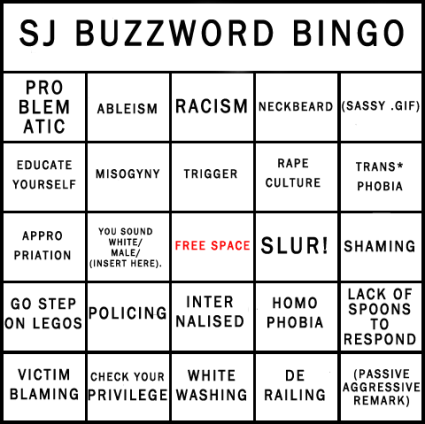Over the last two decades, kids in the U.S. have grown up never not having had the internet. Plumbing the culture they’re maturing in and exploring the places they hone their ideas and social skills can lead to some interesting clues about the future. This is the second in a series of reports on contemporary American pranksters from Emerson Dameron, a writer, storyteller, and humorist searching for signs of life in a world plastered with ads.
4Chan v. Tumblr: Young Idealists at War
by Emerson Dameron
September 6, 2014
This summer, some of the most extreme personae on the internet celebrated their constitutional freedom of association by going to war.
Various self-contained hives of the internet give its users thousands of targeted factions to join. Over time, these sub-communities foster their own in-jokes, jargon, and culture that defies penetration by outsiders. They can be maddeningly complex. Asking their denizens the most basic of questions pegs one as impossibly square, an easy mark for mockery that strengthens the group.
These subcultures sometimes compete with each other. It can look silly from the outside, but the stakes can be quite high for those involved.

In the last few years, the blogging platform Tumblr, with its emphasis on sharing and community rather than high-effort original content, has become a hub for young outsiders looking for very specific places to belong. It may be eroding Facebook’s dominance among teenagers and college students, quite a few of whom seem to be in the early stages of embracing feminist theory, questioning their sexuality, and performing fraught public experiments with personal identity, gender, and politics. Because they feel so ostracized in “real life,” these Tumblr users can be intensely protective of each other and hostile toward anyone who may be antagonizing them in their safe spaces. There are too many examples of this wagon-circling to catalog comprehensively, but witness the overwhelming backlash when their own heroes, in this case popular YouTube musicians, are uncloseted as abusers. (More elaboration on this controvery from Daily Dot here).
Their critics call this effect a “hugbox” for “social justice,” an echo chamber wherein dissent is verboten and unorthodox opinions are allowed to mutate. Some have built their own subcultures around mocking so-called “social justice warriors” and pushing their various large, flashing sensitivity buttons, passing around their own inside gags, such as this “Social Justice Bingo Card.”

Tumblr isn’t the most fertile soil for complex arguments and nuance. One simple way to gain fans and attention is to out-extreme and out-orthodox one’s fellows, to value overheated catharsis over all else. Sometimes these charged rants attract attention from other online groups, with different values, who crave different sorts of attention.

The website 4Chan contains multitudes of groups, literally and in the Whitmanian sense. What started in 2005 as a simple image-trading board has taken on several different lives of its own. Its users include the hacker group that adopted “Anonymous” as an official brand identity, locked arms with Wikileaks, and has endeavored to take down mammoth corporations and highlight perceived bullying and miscarriages of justice. It is also home to many users who seemingly “just want to watch the world burn.”
How they manage to coexist without ripping each other apart is a mystery, but 4Chan is a mysterious place. Some users are straight-up bullies; others “bully the bullies.” “Moralfag” is a token retort, but they rarely challenge each other the way they’re known to go after outsiders.
For years, 4Chan has been the internet’s frontier for shock humor, a place where most users are anonymous and the highest crime imaginable is overt self-importance. “The internet is serious business” is one of its sarcastic secret-handshakes, which implies that nothing on the internet should be taken seriously and anyone who thinks it should needs to be shaken into numb cynicism, usually through blunt, obnoxious pranks.
Sometimes these missions intrude into people’s real lives, making them unmanageable for a time. This is intended to convince people to lighten up about all this, which seems paradoxical, but there you go. 4Chan is the internet’s tar baby. To challenge it is to get stuck with it in a humiliating fashion. And it can sometimes instigate its own fights.
Quite recently, 4Chan has become a focal point for rage against video-game designer Zoe Quinn and gaming-industry critic Anita Sarkeesian. It also facilitated the leaks of dozens of private photos stolen from celebrities. (The sub-group AnonIB may have done the actual hacking, but it spilled over to reddit and national news because of 4Chan at large.) To say that some 4Chan dwellers are hostile to some women would be fair comment.
4Chan and Tumblr have been going at each other for awhile. 4Channers created several hashtags and fake “trends” carefully designed to bring out extreme behavior on Tumblr. #OperationBikiniBridge encouraged borderline anorexia as a fashion statement. #EndFathersDay tried to stoke hostility toward a “patriarchal” holiday in a manner that was bound to look ridiculous to anyone outside of the hugbox. 4Chan’s efforts were not entirely unsuccessful. More than anything else, they fed into existing tensions between online cliques with certain vague parallels to America’s political left and right.
Users of 4Chan decided to use July 4th, a major American holiday on which a lot of less intense people are away from their computers, to go all-out against Tumblr. Large groups of anonymous users from /pol/, a 4Chan community devoted to “political incorrectness,” flooded popular “social justice” tags on Tumblr with a mix of gore, abuse porn, and pictures of cute animals, upending their context and making them impossible to use for coherent discussion.
Tumblr users reacted harshly and predictably, creating official-looking petitions to have 4Chan banned from the web and joining together like they never had before to protect each other’s sensitivities from this electronic aggression, which felt very real to them. This further galvanized /pol/, who love to get any sort of reaction, particularly an overreaction, since “rustling jimmies” makes them feel accomplished in their bizarre moral mission.
This video documents the battles, from 4Chan’s point of view, in the immediate aftermath. It gained wild popularity.
Yes, if you’ve made the understandable decision to steer clear of these activities, all this seems rather frivolous. But this is how heated and specialized prank wars can get on the internet. At first, it seemed like a one-sided electronic assault, but Tumblr wasn’t content to ignore it and hope it went away. With their rants, petitions, and creative counter-initiatives, Tumblr users have repeatedly made it clear that the old don’t-feed-the-trolls rhetoric doesn’t satisfy them. When abuse escalates, they want to empower themselves.
For a lot of people who have yet to mature into their real social influence, this stuff is serious business indeed.
